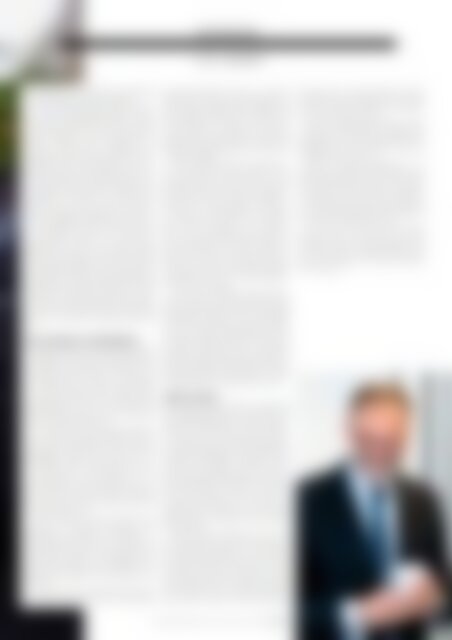Credit Management June 2018
The CICM magazine for consumer and commercial credit professionals
The CICM magazine for consumer and commercial credit professionals
You also want an ePaper? Increase the reach of your titles
YUMPU automatically turns print PDFs into web optimized ePapers that Google loves.
INTERVIEW<br />
AUTHOR – SEAN FEAST<br />
attracted by the international challenge<br />
and bringing the business together.”<br />
It was a similar intrigue that ultimately<br />
led to his joining Hoist Finance: “I had<br />
met Jorgen (the previous CEO) on several<br />
occasions and it was clear that we shared<br />
similar thoughts on the importance of<br />
culture, values, ethics, compliance and<br />
regulation. He was very visionary and entrepreneurial.<br />
My challenge now is continuing<br />
to grow the business and ensure<br />
we have the processes and structure to accommodate<br />
future growth without losing<br />
momentum. Growth is our number one<br />
ambition, so we need to focus on operational<br />
excellence and ensure our strategies<br />
are aligned throughout the business.”<br />
Klaus-Anders has been quick to put<br />
his personal stamp on the business,<br />
explaining his vision to the team across<br />
Europe in a series of ‘town hall’ meetings<br />
and canteen lunches. His views on credit<br />
are refreshing: “What we do is important,”<br />
he explains. “Without credit, growth stops<br />
and transactions don’t take place. If credit<br />
defaults and creditors are not paid, then<br />
trust in the system breaks down, so while<br />
our clients are important, the relationship<br />
with our customers is perhaps even more<br />
so.”<br />
PAN-EUROPEAN COMPARISONS<br />
Being pan-European, Klaus-Anders is able<br />
to compare and contrast the experiences<br />
of different consumer types and their<br />
attitudes towards credit: “Whether you<br />
are talking to a consumer in Duisburg<br />
or Milton Keynes, most people want<br />
to repay their debts and honour their<br />
commitments. Our role is to help them<br />
and motivate them to achieve that and<br />
return to financial health.”<br />
In terms of how he intends to deliver<br />
on his vision, the new CEO tells me of a<br />
story recently published in the Guardian<br />
newspaper about the success of the<br />
Norwegian Alpine Skiing team and its<br />
‘no jerks’ policy: “One reason they are<br />
so successful is that although it is an<br />
individual sport, they help each other, and<br />
try and learn from each other, working<br />
as a team. They won’t tolerate jerks, and<br />
that’s why they win!”<br />
Klaus-Anders is keen to see the same<br />
concept of ‘sharing’ knowledge and<br />
experience throughout the group as a<br />
key ingredient to success. A good idea in<br />
Germany, he believes, will be a good idea<br />
in the UK or Spain. “The challenge is in<br />
knowing what we know,” he explains, “and<br />
then documenting it so that everyone can<br />
benefit.”<br />
His views on the pan-European market<br />
for debt sale and purchase are especially<br />
interesting. While the UK is a mature<br />
market, he sees this as an advantage: “The<br />
UK is mature, professional, sophisticated<br />
and highly regulated, and I expect the<br />
other markets to follow which will be<br />
a good thing,” he explains. “I welcome<br />
regulation as a friend; it raises the bar and<br />
means that the thresholds for entering the<br />
market are higher.<br />
“I like mature markets,” he continues.<br />
“They are rational and competitive, and<br />
the risk/reward is positive. We are also<br />
looking at new and less mature markets<br />
like Italy (Intrum recently completed a<br />
large deal in Italy), Spain and Greece.<br />
In Spain, the unemployment numbers<br />
are coming down, but at 16 percent,<br />
Spain is still a laggard. At the peak of<br />
the crisis, 40 percent of those under 30<br />
were unemployed. Although things are<br />
improving, the crisis is not resolved. In<br />
Greece, too, they are enjoying a recovery<br />
and we are early to the market through a<br />
partnership and now our own platform,<br />
so that too is exciting.”<br />
In terms of portfolio types, Klaus-<br />
Anders quashes previous discussions that<br />
may have been aired about diversifying<br />
into different markets. “Our core strength<br />
is the banks and being a bank ourselves<br />
we have a better understanding of how<br />
the banks’ agendas can move, and what<br />
we need to do to add value. A specialist<br />
will beat a generalist every time; focus is<br />
good. Focusing on a few markets and one<br />
customer group is our mission – to have<br />
wider products and deeper penetration.”<br />
ASSET CLASSES<br />
While Klaus-Anders rules out acquiring<br />
non-banking portfolios, he does not rule<br />
out extending the asset-classes of interest.<br />
Whereas traditionally Hoist Finance<br />
has focused on non-performing loans,<br />
it recently acquired its first portfolio of<br />
commercial mortgage loans and is looking<br />
at what he describes as ‘adjacent’ asset<br />
classes such as SMEs, secured loans and<br />
other paying/performing assets. Servicing<br />
also remains key: “We like our business<br />
model,” he laughs, “and have access to<br />
very efficient funding. It is good to be<br />
regulated to the same level as the banks<br />
and investors are happy with our healthy<br />
balance sheet.”<br />
The new CEO is perhaps conscious that<br />
previous roles have not lasted as long as<br />
he originally envisaged. It is with some<br />
hesitation, therefore, that I ask him where<br />
he sees the business in three years’ time<br />
and what success will look like: “Success<br />
will be when we are one of the big five and<br />
have a reputation as a reliable, innovative<br />
partner with a culture, values and beliefs<br />
that stand out. Success will also come by<br />
being a leader in the digital space, not just<br />
in how we interact with our customers,<br />
but also in how we use data.<br />
“All of us talk about the volume of data<br />
we hold, but actually what is important is<br />
using that data to gain knowledge, from<br />
knowledge we gain insight, and from<br />
insight we deliver action.”<br />
Given his naval background, it is<br />
perhaps unsurprising that he owns a boat<br />
and a second home on the coast which he<br />
shares with his spouse Maria – when they<br />
are together: “She is the CEO of DEA AG,<br />
an oil and gas major based in Hamburg,<br />
so we FaceTime during the week and see<br />
each other at weekends,” he says.<br />
As well as four grown-up children<br />
between them, they also have joint<br />
custody of a 14-year old Norwegian Forest<br />
Cat called Nemi. “Everybody asks about<br />
the cat,” he laughs. “It is very much part<br />
of the family.”<br />
The Recognised Standard / www.cicm.com / <strong>June</strong> <strong>2018</strong> / PAGE 15


















